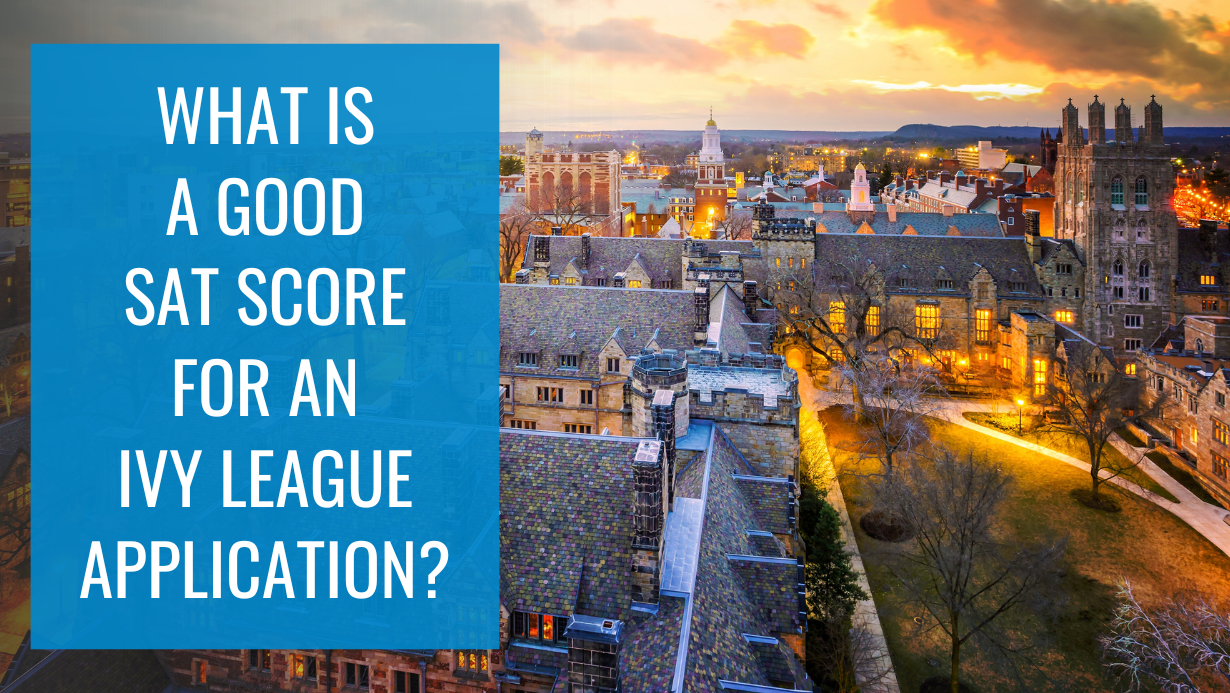Because of the Ivy League’s level of prestige and high-esteemed academics, competition for its coveted few freshman class spots is fierce. Hundreds of thousands of students apply each year to the Ivy League from around the world – for the Class of 2027, over 400,000 students applied across all eight Ivy League schools.

This Article Will Discuss The Following:
- What Makes a Good Ivy League Candidate?
- Ivy League Testing Averages – What is a Good Score for the Ivy League?
- When To Send SAT/ACT Scores
- What is a Free Score Report?
- When is the Last Time I Can Take the SAT/ACT Before I Apply?
- What is Superscoring?
- What About AP Exams?
- Necessary Evil
See more detail in the table below:
Ivy League Admissions Statistics
| Ivy League College | Overall Acceptance Rate | Total Applications Received |
| Brown | 5.23% | 51,316 |
| Columbia | 3.90% | 57,129 |
| Cornell | 7.90% | 67,846 |
| Dartmouth | 6.23% | 28,841 |
| Harvard | 3.41% | 56,937 |
| Penn | 5.80% | 54,588 |
| Princeton | 4.50% | 39,644 |
| Yale | 4.50% | 51,803 |
For the 2023 admissions cycle (students applying for the Class of 2027), these numbers skyrocketed, mostly due to the fact that the Ivy League schools all went test-optional. This meant that students were still allowed to submit standardized test scores but were not required to do so. This opened up the doors to a number of applicants who previously would not have applied, making the competition even stiffer for Ivy League colleges.
While the trend towards eliminating standardized testing is being reversed at many top schools as they once again require testing, test scores remain an important component of a competitive Ivy League application.
The SAT/ACT exam is especially important for international students. They usually don’t have the AP/IB curriculum scores to show a standardized level of knowledge, expertise, and strong potential in certain areas, so admissions officers only have the SAT/ACT as a barometer.
What Makes a Good Ivy League Candidate?
Students applying to the Ivy League have perfect or near-perfect scores, are involved in a number of high school extracurricular activities, particularly making positive impacts in their communities, and demonstrating a deep intellectual curiosity.
Additionally, Ivy League schools are looking for leaders. They don’t want someone whose application looks exactly like hundreds of others; rather, they want to find the singular attributes that make you the strongest candidate in your field, region, etc. Because of this, it’s absolutely essential that Ivy League applicants lean into what makes their voice and experiences unique.
The academic profile (GPA, standardized test scores, courseload rigor) isn’t the only metric by which a student is evaluated; however, it’s a very important one for top schools like the Ivy League.
Essentially, having a strong GPA, high test scores, and the most difficult courseload rigor at your high school gives you a seat at the table to be evaluated by the admissions committee – and that’s when your extracurricular activities, research, community work, etc. start to play a part.
Schools want to make sure you have the quantitative background before they evaluate your qualitative background.
That’s how they know that you can handle the workload and thrive at their school. If you have a transcript with a number of Bs, average courseload rigor, and a weaker testing profile, they will not believe you can manage the workload and still make an impact in and beyond the classroom, and you will not be accepted.
Ivy League Testing Averages – What is a Good Score for the Ivy League?
When applying to the Ivy League, you’ll want to make sure that if you’re submitting test scores that they are competitive for the school. Generally, we recommend an applicant needs scores that fall into the top 25% or higher admit range for the colleges to which they apply.
Ivy League Testing Averages
Bottom Line: You need to score a 1560+ average SAT score and/or 35+ average ACT score to be competitive for the Ivy League.
When to Send SAT/ACT Scores
Many colleges will require you to submit official test reports to their admissions teams. This takes time, as you have to order the test reports to be sent by the ACT and the College Board directly to each college that requires an official report. Therefore, you should plan this into your list of deadlines when putting together your college application timeline.
Generally, the best time to submit your standardized test scores is roughly one month before the deadline, to ensure that they get to the admissions committee with plenty of time. This gives you some buffer in case there are any issues. You can submit scores at any point, though – the ACT and the College Board allow you to submit your scores to colleges whenever you’d like.
Many schools will allow you to self-report your SAT/ACT scores (as well as AP/IB supplemental testing scores). It’s absolutely essential that you check each school’s testing policy websites for the most up-to-date information on what they require in terms of score submission.
You can access a school’s testing policy on their main homepage in the Common Application or the Coalition Application, you can find their testing policy on their Admissions department website, or by calling the Admissions department directly.
How Long Does It Take to Send SAT/ACT Scores?
It takes approximately 10-14 days for a college to receive your SAT/ACT scores from when the ACT or College Board sends them.
You should plan this into your application timeline. The reason it takes a variable amount of time is that each college has a different way they’ve opted to receive scores from the College Board, so sometimes it’s faster than others at certain colleges. The general rule is to plan for at least two weeks for your scores to be received. If you need, Rush Reporting may be an option for you, as well.
What is a Free Score Report?
According to the College Board, “You can send four free score reports to colleges every time you register for the SAT. This is the fastest way to send scores to colleges and scholarship programs—and there’s no fee. You can use your free score reports up to 11:59 p.m., U.S. Eastern Time, nine days after the test. If you’re eligible for an SAT fee waiver, you can send as many score reports as you want for free.”
The issue with this is that you don’t get to see your scores before they’re released. It’s best to see how you score on the exam before submitting your test scores directly to schools.
When is the Last Time I Can Take the SAT/ACT Before I Apply?
Many students want to have another chance to take the SAT/ACT before they apply to schools in the fall of senior year. Therefore, it’s essential you know the last possible date you can take the SAT/ACT and still use those scores for evaluation.
Generally, for the Ivy League, the following dates apply:
SAT/ACT Test Dates:
| Test | Early Decision | Regular Decision | Transfer Decision |
| Last SAT Date | November | December | March |
| Last ACT Date | October | December | February |
There’s no major preference between the SAT or ACT for Ivy League schools.
What is Superscoring?
Many schools offer the opportunity to superscore your SAT or ACT exam. This is a process whereby schools take your highest EBRW (Evidence-Based Reading and Writing) SAT section with your highest Math SAT section across multiple tests to calculate a “superscore.”
For the ACT, if schools offer the chance to superscore, they will take the highest English, Reading, Math, and Science section scores across multiple tests to calculate an ACT composite superscore.
Often, schools that allow students to self-report their highest section scores to achieve a superscore will request official testing reports to verify those scores.
It’s important that you take the time to read through each school’s individual testing policies to see whether they offer SAT/ACT superscoring and what is required of you when you apply, in terms of submitting scores (by self-reporting or sending official testing reports).
What About AP Exams?
Students who have access to AP (Advanced Placement) courses at their high school should be taking advantage of that curriculum and maximizing the number of AP classes they can take – especially during junior and senior year, which are the most scrutinized for college admissions.
Full list of AP subjects available:
- AP Art History
- AP Biology
- AP Calculus AB
- AP Calculus BC
- AP Chemistry
- AP Chinese Language & Culture
- AP Comparative Government & Politics
- AP Computer Science A
- AP Computer Science Principles
- AP English Language and Composition
- AP English Literature and Composition
- AP Environmental Science
- AP European History
- AP French Language & Culture
- AP German Language & Culture
- AP Human Geography
- AP Italian Language & Culture
- AP Japanese Language and Culture
- AP Latin
- AP Macroeconomics
- AP Microeconomics
- AP Music Theory
- AP Physics 1: Algebra-Based
- AP Physics 2: Algebra-Based
- AP Physics C: Electricity & Magnetism
- AP Physics C: Mechanics
- AP Psychology
- AP Research
- AP Seminar
- AP Spanish Language & Culture
- AP Spanish Literature & Culture
- AP Statistics
- AP Studio Art: 2-D Design
- AP Studio Art: 3-D Design
- AP Studio Art: Drawing
- AP U.S. Government & Politics
- AP U.S. History
- AP World History
Necessary Evil
Standardized testing is a necessary evil of the college admissions process – especially when applying to an Ivy League school. It’s important to score a 1560+ on the SAT and/or 35+ on the ACT to be competitive for the Ivy League.
Therefore, you should pursue a robust test preparation plan to get ready for the SAT/ACT, and work with your college admissions counselor to put together the best testing plan to maximize your results.
Sources:
https://satsuite.collegeboard.org/sat/dates-deadlines
https://www.act.org/content/act/en/products-and-services/the-act/registration.html
See Links to the Common Data Sets or other Data Sources for each school in the tables above.

Former Admissions Reader at Stanford University,
3 Years in Stanford University Admissions,
2,500+ Applications Read and Evaluated,
Peter Zimmerman is a Senior Admissions Consultant with Solomon. Peter earned his Bachelor’s Degree from The College of William and Mary in Art/Art History, with minors in Anthropology and Japanese Studies.
He graduated summa cum laude and was inducted into Phi Beta Kappa – the United States’ oldest honor society for liberal arts colleges. Mr. Zimmerman was one of the first students ever to receive W&M’s prestigious 1693 Scholarship — one of the most distinguished scholarship programs in the country, emphasizing student-led research and academic excellence. In addition, he was awarded W&M’s Martha Wren Briggs Scholarship for academic distinction in Art History. He also attended the Tuck School of Business at Dartmouth.



